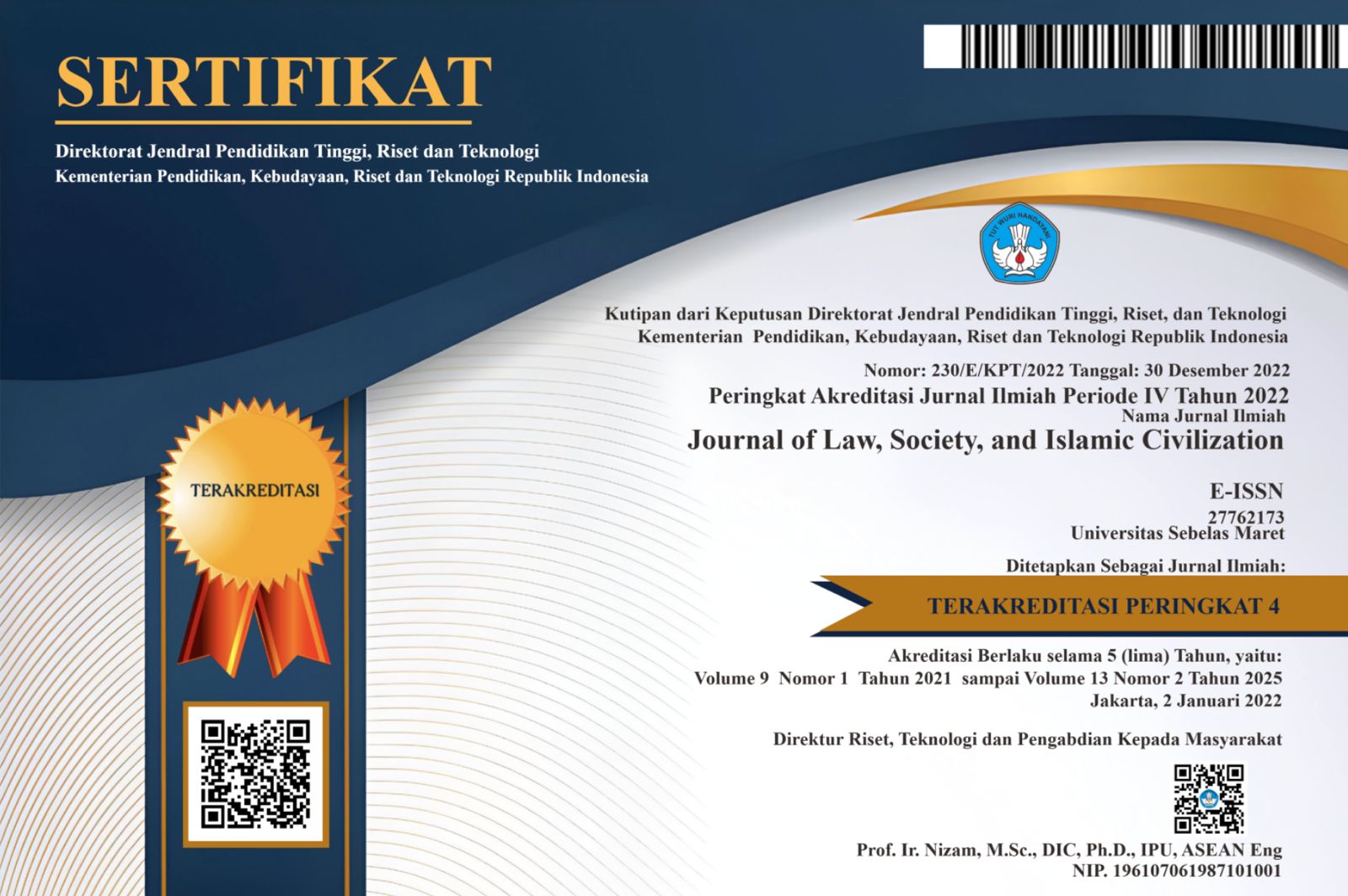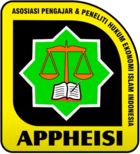Perkawinan Beda Agama Menurut Hukum Positif, Hukum Islam dan Hak Asasi Manusia di Indonesia
Abstract
Problems regarding marriage are becoming increasingly complex along with the development of Indonesian society. There are marriage cases that are worth debating because marriage is a legal action that has consequences for the married couple and the country where they live. One of them is interfaith marriage, which has become a current phenomenon. This kind of study is known as doctrinal or normative legal research. In addition to primary, secondary, and tertiary legal materials, this research will make use of secondary legal sources. The laws pertaining to interfaith weddings have been examined from a legal and human rights standpoint in order to conduct study into the fundamentals and systematics of law. The regulations in the marriage law do not clearly regulate interfaith marriages and do not explicitly state that interfaith marriages are prohibited. Customary law also does not provide an explicit explanation regarding interfaith marriages, there are customary laws that do not recognize interfaith marriages, and there are also customary laws that recognize them using several methods of recognition for orderly administration. However, in the Islamic context, interfaith marriages are considered absolutely haram and have the potential to cause controversy and disharmony in the household. Restrictions created by law regarding interfaith marriages do not violate human rights. Of course, if the law is made in accordance with morals, values, public order, security, and religious, it will not be considered a violation of human rights. Even though the Marriage Law and laws in Indonesia do not explicitly regulate interfaith marriages, in practice, people tend to follow existing religious and cultural norms, with the view that marriages should be between individuals who have the same religious beliefs.
Keywords
Full Text:
PDFReferences
Amri, A. (2020). Perkawinan Beda Agama Menurut Hukum Positif dan Hukum Islam. Media Syari’ah, 22(1), 48-64.
Ch, A. L. F., Rozana, K. I., & Muthi’ah, S. K. (2016). Fikih Perkawinan Beda Agama Sebagai Upaya Harmonisasi Agama: Studi Perkawinan Beda Agama di Jember. Fikrah: Jurnal Ilmu Aqidah dan Studi Keagamaan, 4(1), 117-137.
Deklarasi Universal Hak Asasi Manusia
Huzaini. (2022). Perkawinan Beda Agama (Tafsir Ayat Ahkam). Syakhsiyah Jurnal Hukum Keluarga Islam, 2(2), 207-221.
Jalil, A. (2018). Pernikahan Beda Agama dalam Perspektif Hukum Islam dan Hukum Positif di Indonesia. Andragogi: Jurnal Diklat Teknis Pendidikan dan Keagamaan, 6(2), 46–69.
Kharisma, B. U. (2023). Surat Edaran Mahkamah Agung (SEMA) Nomor 2 Tahun 2023, Akhir Dari Polemik Perkawinan Beda Agama?. Journal of Scientech Research and Development, 5(1), 477-482.
Kompilasi Hukum Islam
Nasrullah. (2020). Analisis Hukum Penerapan Pasal 2 Ayat (1) Undang-Undang RI Nomor 1 Tahun 1974 Tentang Perkawinan dan Pasal 35 Huruf a Undang-Undang Nomor 23 Tahun 2006 Tentang Administrasi Kependudukan Pada Kasus Perkawinan Beda Agama. Jurnal Hukum dan Syariah, 16(1), 1-12.
Setiyanto, D. A. (2017). Larangan Perkawinan Beda Agama Dalam Kompilasi Hukum Islam Perspektif Hak Asasi Manusia. Al-Daulah: Jurnal Hukum Dan Perundangan Islam, 7(1), 87-106.
Shidiq, S. (2016). Fiqih Kontemporer. Jakarta: Prenada Media Group.
Siddik, T. I. R. (2021). Perkawinan Beda Agama: Perpektif Ulama Tafsir, Fatwa MUI dan Hukum Keluarga Islam di Indonesia. Al-Tadabbur: Jurnal Ilmu Al-Qur’an dan Tafsir, 6(1), 107–139.
Suadi, A. (2019). Filsafat Hukum: Refleksi Filsafat Pancasila, Hak Asasi Manusia, Dan Etika. Jakarta: Kencana.
Subekti, T. (2010). Sahnya Perkawinan Menurut Undang-Undang Nomor 1 Tahun 1974 Tentang Perkawinan Ditinjau Dari Hukum Perjanjian. Jurnal Dinamika Hukum, 10(3), 329–338.
Sumriyah, D. M. (2021). Hukum Pernikahan Beda Agama Menurut Hukum Islam dan Hukum Formal. Jurnal Ilmiah Universitas Trunojoyo Madura, 2(1), 1-11.
Wahyuni, S. (2016). Pelaksanaan Perkawinan Campur Beda Agama di Daerah Perbatasan Sambas Kalimantan Barat Antara Living Law Dan Hukum Positif Indonesia. Jurnal Al-Ahwal, 9(1), 31-46.Refbacks
- There are currently no refbacks.












